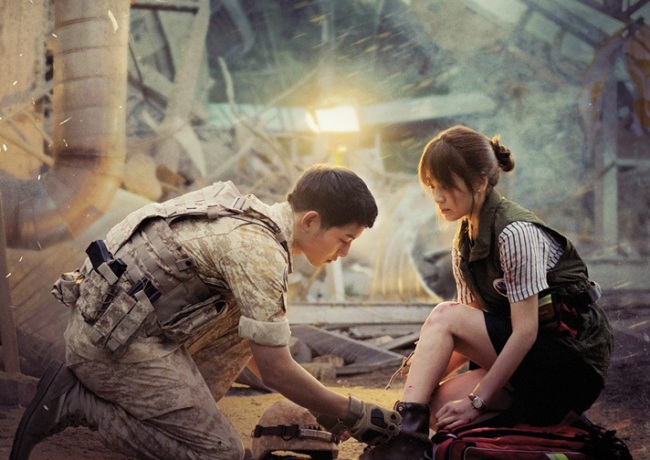[Weekender] ‘Descendants of the Sun’: more fantasy than reality
By 이다영Published : April 8, 2016 - 17:55
Lee Soo-yeon, a 27-year-old office worker in Seoul, can’t get enough of “Descendants of the Sun,” the ongoing Korean drama series that features a military romance between a solider and a surgeon.
“I think the series has many things that I can’t really see or achieve in my real life, such as the sense of justice, responsibility and altruism,” she told The Korea Herald. “And on top of all that, it is just very romantic.”
The 16-episode series takes place in a fictional war-torn Mediterranean country named Uruk, and features the story of special forces Capt. Yoo Si-jin, played by heartthrob Song Joong-ki.
“I think the series has many things that I can’t really see or achieve in my real life, such as the sense of justice, responsibility and altruism,” she told The Korea Herald. “And on top of all that, it is just very romantic.”
The 16-episode series takes place in a fictional war-torn Mediterranean country named Uruk, and features the story of special forces Capt. Yoo Si-jin, played by heartthrob Song Joong-ki.

He is in charge of mysterious and dangerous peacekeeping duties and falls for an army surgeon, Kang Mo-yeon, played by A-list actress Song Hye-kyo.
While the series garnered avid followers in Korea and abroad, even being cited as a tremendous economic and tourism booster, the enormous popularity of the military romance ironically reflects what today’s Korean society lacks, critics say.
“I think the character played by Song Joong-ki is great. He’s capable, courageous and has a sense of integrity,” said activist Lim Tae-hun, who heads the Military Human Rights Center -- an advocacy group calling for human rights reforms in the Korean military. “The only thing is that it’s almost impossible for a soldier like him to exist in South Korea’s military system.”
While the fictional character Yoo in the show enjoys special comradeship with his fellow soldiers, Lim said such military relationships were far from the reality, where suppressive military culture prevails and cases of abuse by soldiers are frequently reported.
“I’d say there is just no sense of dignity in the Korean military,” Lim said. “You don’t have any privacy. There is a strict hierarchy within the system. You don’t have the option of quitting while serving your military duty, unless you are willing to become an ex-convict.”
An able-bodied man refusing to perform his service leads to a jail term of one year in South Korea. Military duty is often therefore perceived as an inevitable obligation rather than a heroic deed.
Other experts pointed out that the series promotes patriarchal values and nationalism. The series even won praise from President Park Geun-hye, who recently said the show could help “instill patriotism” among young Koreans. Patriotism is the Park administration’s most prioritized value, with such high-ranking officials as Prime Minister Hwang Kyo-ahn trumpeting all government-led policies as being based on the love for the country.
Acerbic critics of the series also note that the dialogues often reflect deeply embedded discrimination, which in another language would likely sound downright offensive.
In her column published last month, film critic Hwang Jin-mi pointed out that the character Yoo often makes sexist comments.
“He says, ‘it is my duty as a solider to protect children, the elderly and pretty women,’” she writes in the column published in a local daily. “Why does it have to be ‘pretty women,’ instead of just ‘women’?”
Hwang also addressed in the column that while the surgeon Kang is seemingly depicted as an independent, capable woman who offers medical relief to disaster victims in Uruk, she is always rescued by Yoo whenever she is in a life-threatening situation.
To Hwang’s comments, culture critic Lee Moon-won said the series in fact specifically targets female viewers, not the other way around.
“Most Korean men -- especially those who have served their military duties -- don’t want to watch TV drama series that feature men in military uniforms,” he said.
“Most of them don’t find any joy in watching fellow men being trained in the military. It’s the kind of experience that they’d rather not be reminded of. I argue that the series fulfills fantasies of female viewers, especially the one of physically strong men in uniforms who are also extremely caring and romantic at the same time.”
Critic Lee however said the show does reflect Korea’s situation of gender imbalance which makes women more vulnerable to financial insecurity and unemployment.
“I think patriarchal men can be seen as attractive to female viewers when they are exceptionally capable, physically strong and responsible,” he said.
“Given today’s sluggish economy and job market, it’s hard to find such (everyday supermen) who have those qualities whether they are patriarchal or not. I think the popularity of such strong, male military characters in the show reflects women’s collective insecurity and anxiety.”
By Claire Lee (dyc@heraldcorp.com)





![[Herald Interview] 'Amid aging population, Korea to invite more young professionals from overseas'](http://res.heraldm.com/phpwas/restmb_idxmake.php?idx=644&simg=/content/image/2024/04/24/20240424050844_0.jpg&u=20240424200058)











![[KH Explains] Korean shipbuilding stocks rally: Real growth or bubble?](http://res.heraldm.com/phpwas/restmb_idxmake.php?idx=652&simg=/content/image/2024/04/25/20240425050656_0.jpg&u=)

